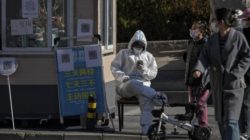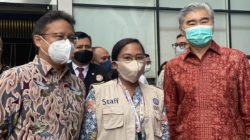SHANGHAI: After two months of grinding COVID-19 lockdown, the Chinese metropolis of Shanghai moved closer to a gradual reopening, as the capital Beijing maintained limits that have dramatically restricted movement even as case numbers decline.
Shanghai hopes to lift its lockdown on Wednesday (Jun 1). In the last week, more people have been allowed to leave their houses, and more businesses have been allowed to reopen, albeit most inhabitants remain mostly restricted to their housing compounds, and most stores are limited to making deliveries.
On Saturday, Shanghai officials warned citizens to remain vigilant, despite the fact that the vast majority of the city’s 25 million people live in low-risk “prevention” zones.
“Wear masks in public, avoid crowds, and maintain social distance,” Zhao Dandan, deputy head of the Shanghai Municipal Health Commission, said during a daily press briefing.
Videos on social media showed Friday night revellers, many of whom were foreigners, drinking and dancing in the street in a central area of the city, only to be interrupted by police officers ordering them to leave.
Another video showed a group of people on the street singing “Tomorrow Will Be Better,” an emotional anthem from 1985, accompanied by a keyboard player. When the cops arrive, they let the song end before asking them to leave, earning online plaudits for their restraint.
The two-month lockdown of China’s largest and most cosmopolitan city has irritated and enraged citizens, hundreds of thousands of whom have been quarantined in frequently overcrowded central facilities. During the first several weeks, many inhabitants struggled to get enough food or medical attention.
IMPACT ON THE ECONOMY
While national case numbers are improving, China’s rigid devotion to zero-COVID has damaged the world’s second-largest economy and rocked global supply chains, scaring investors concerned about the lack of a plan for exiting what has been President Xi Jinping’s signature policy.
The economic impact was obvious in data released on Friday, which showed that industrial business profits fell 8.5% year on year in April, the steepest decrease in two years, due to high raw material prices and supply chain disruption induced by COVID-19 limits reducing margins and disrupting manufacturing activity.










